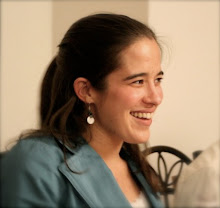written January-February 2012
http://www.preciouslife.com/?va=1&vc=279
A few months ago, I had my first prenatal patient deliver a baby with Down syndrome. After a discussion of risks and benefits, this patient had elected not to do prenatal genetic screening, so the diagnosis of her newborn was a surprise to all of us after delivery. I was surprised and then frustrated by my own reaction: disappointment. I found that I felt some obligation to deliver her a "perfect" baby and that I thought this baby didn't meet the criteria (whatever they are!). And then I felt awful for feeling that, because I know personally several people with Down syndrome and they are wonderful people, full of dignity and life. Even if they weren't wonderful people individually, however, I fully believe they share the worth that all of us have as humans, imperfect though we all are.
http://img2.allvoices.com/thumbs/image/609/480/78250276-downs-syndrome.jpg
As I was processing my reaction, I came across a Christianity Today article by Amy Julia Becker about her experience of having a child with Down syndrome, "My Perfect Child." In it, she writes about the biblical concept of perfection where we are called to be perfect even as God is perfect: "[T]his perfection has to do with becoming a certain type of person. It has to do with becoming the complete, whole, mature, full version of ourselves." She then goes on to look at the Beatitudes' blessings as signs of what it means to be fully, perfectly human and concludes that it is "about meekness, sorrow, and longing for God...[about] understanding ourselves as creatures." Through her experiences with her daughter with Down syndrome, she realized that despite our accomplishment-prizing culture, "a major aspect of recognizing my humanity meant recognizing that I am vulnerable, needy, dependent, and limited."
I think I have lost some of that realization, at least deep-down emotionally, and have begun thinking that the goal of "perfect" humanity is all the things our society - and my profession - values: achievement, financial success, high test scores, knowing all the right answers, solving all the problems (although I know we never can, especially the ones that matter most). Somewhere along the way, I started thinking that these are the measure and goal of us as human beings, probably because I naturally do well at some of these things and so feel affirmed as a worthwhile person when I use them as a measure. That too easily can lead to devaluing those who do not "measure up," like my new patient with Down syndrome.
What if being perfect means something different entirely, as Amy Julia Becker describes above?
http://laist.com/2007/08/26/dr_william_mobl.php
As I moved through Advent in December, I thought a lot about Jesus' voluntary giving up of power, honor, and knowledge to take on fragility, vulnerability, and human frailty and limitations as a baby. I found (and find) myself struggling to transfer my treasuring of his action in history to then learning to value our human weaknesses, to recognize our creaturely identity (necessarily more limited than the Creator) as what it truly means to be human, and to grapple with what failures to measure up I should allow and even embrace with grace in myself and others.
If Jesus is the perfect Man, do I actually want to follow Him in his path of limitation and weakness? Do I really desire to emulate his full submission to God, his giving over of control, as a model for what it means to be finally and fully human? How can I give up my desire to control, to make everything "right" (in my narrow definition) in my own life and others' lives? How would life lived without that need for control look?
I find that my perfectionism spills over even into how I see myself and my life lived before God, crippling my ability to trust and to live freely. What if life were more about living it all before Jesus and for love of God in an atmosphere of grace and not so much about whether I meet the standard, hit the mark, or manage to avoid failing?
It reminds me of a comment by Henri Nouwen about forgiveness where he explains it is "allowing the other not to be God" and thus not to be omniscient and perfect. My perfectionism - requiring, demanding no mistakes of myself; having high expectations for others - has many more reinforcements in our society and my profession, but I am struggling to remember to let myself and those around me be what they are - creatures. Flawed and imperfect, wondrous and lovable, miracles even when they require that we change our expectations. I'm learning to love a certain little miraculous baby with a recognizable face in the process.
http://liveaction.org/blog/a-world-without-people-with-down-syndrome-at-what-cost/down-syndrome-child-1/


No comments:
Post a Comment
Note: Only a member of this blog may post a comment.